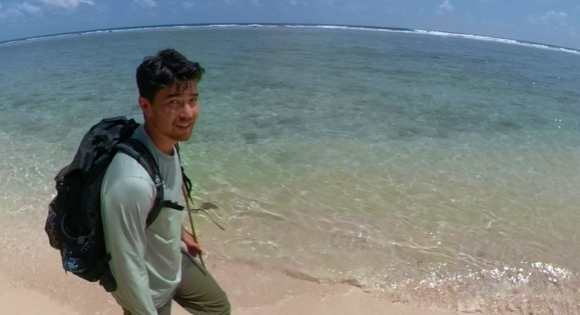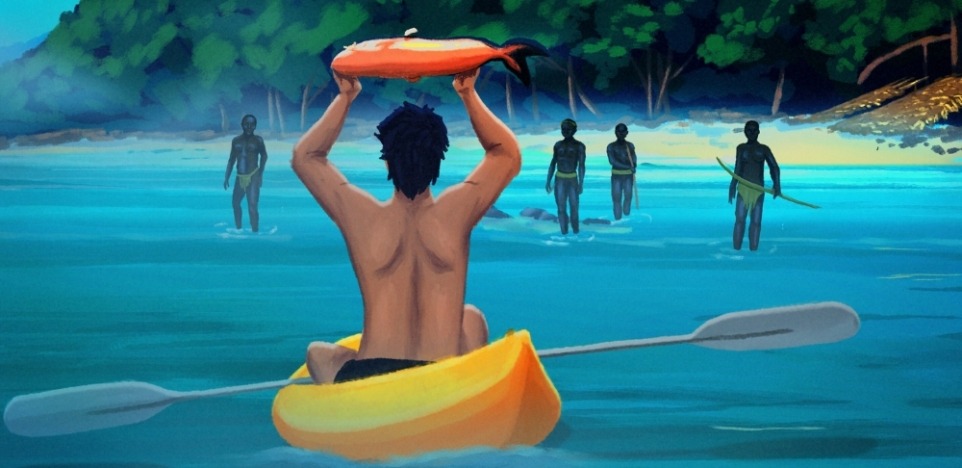On November 15, 2018, John Chau penetrated the sanctuary of North Sentinel Island in the Bay of Bengal, off the coast of India. He approached in a kayak, carrying fish, a first aid kit, various supplies, and his Bible. Close to the beach, he met some North Sentinelese. He disembarked (“to show them that I too have two legs”) and preached briefly, holding up a Bible. A North Sentinelese child shot an arrow straight through to the book of Isaiah. Then some others stole his kayak.
Chau swam back to the Indian boat that had illegally motored him to the protected islands, regrouped, and prayed. Before sleep, he wrote in his journal, “LORD is this island Satan’s last stronghold where none have even had a chance to hear Your Name?” The next day, he returned to the island and was killed.

Those words from Chau’s journal and so many other expressions of evangelical fervor, certainty, and superiority echo throughout Jesse Moss and Amanda McBaine’s film The Mission, which uses Chau’s life to explore the codependent relationship between western colonialism and Christian evangelicalism.
Moss and McBaine capture many perspectives on Chau’s personal faith life, but they also tell a bigger and more confessional story (appropriately, given that this is a National Geographic production!): the historically devastating entanglement of The Great Commission (to spread the gospel to every nation) with boys’ adventure stories rooted in colonial narratives of supremacy. To tell this double-layered story, they include interviews with other missionaries, adventurers, and travel writers; evangelical leaders; and Chau’s teachers (at Oral Roberts University), friends, and father.
The perspectives on Chau’s personal faith-life range from “mad” to “misguided” to “martyr.” Perspectives on the essential colonialism of extreme evangelism are correspondingly varied: for some, the desire to reach the “untouched” is the ultimate act of pure love and devotion; for others, it is admirable but impossible due to cultural differences; for still others, it is “idealism masquerading as God’s calling” and supremacist violence by another name.
As a 20-year exvangelical myself, some of the perspectives given were physically uncomfortable to listen to, like sitting at a holiday dinner as someone related to you says ignorant and subtly hateful things. As the film began, I bristled at how many times Chau and others used the word “unknown” to describe the North Sentinelese culture, language, and beliefs. That word has a whole argument built into it that isn’t always acknowledged: the unknown is an affront, an agitation, an itch; the unknown must become known.
But in the spiritual life, “unknown” is not a taunt; it is an invitation. The argument becomes a question — “unknown to whom?” — and can then be released from an essentialist (and violent) meaning to the field of productive ambiguity. In that field, the word “unknown” can, and should, be both celebrated and deconstructed.
We can, and should, celebrate the North Sentinelese and other peoples as expert resisters of a culture that is not for them. We might celebrate their insight in determining that those who intrude uninvited do not know the meaning of hospitality and therefore cannot be guests.
And then we might deconstruct “unknown” entirely. Moss and McBaine do this, albeit not explicitly, by documenting many other attempts to contact the North Sentinelese. People, especially Chau, knew things about them already; there was a history of contact, and none of the instances went well, for the invader or for the North Sentinelese.
There was evidence of the North Sentinelese worldview; it was clear, and it was known: We don’t want you here.
And so “unknown” and “untouched” actually mean “unconvinced,” “unconverted,” and perhaps, “self-respecting.”
The Mission helps us to pull apart the relationships between these words and their associations, in order to reveal realities of violence and superiority that are inconsistent with love and devotion to any god, but certainly inconsistent with the banner verse for evangelicals: “For God so loved the world…”
More broadly, the film helps reveal the ways in which extremists thrive by turning “knowing” into an act of faith, and certainty into a marker of deep faith. Of all the associations that need to be decoupled, “certainty” and “faith” must be at the top. We might start by watching The Mission and proceed by practicing X-The Mystery and embracing uncertainty, doubt, humility, and hospitality.
